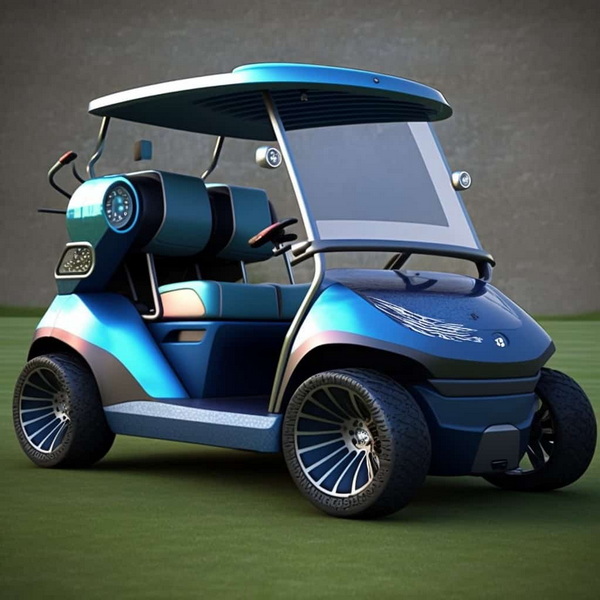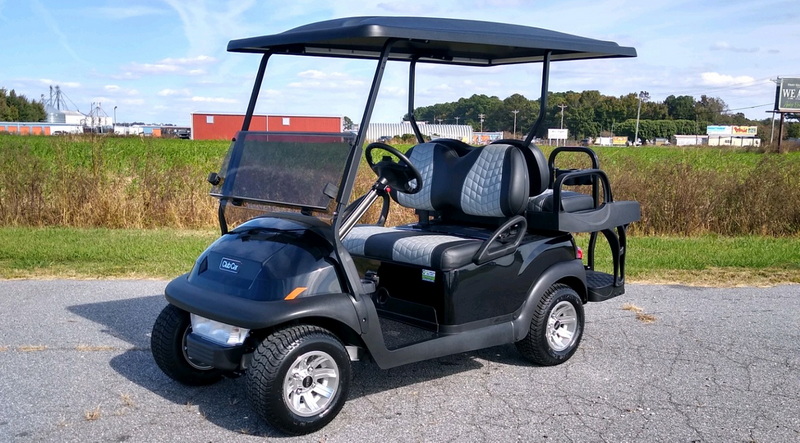Content Menu
● Understanding Electric Golf Cart Batteries
>> Lead-Acid Batteries
>> Lithium-Iion Batteries
● Factors Affecting Charging Time
>> Battery Type
>> Charger Amperage
>> Battery Condition
>> Initial Charge Level
>> Temperature
● Best Practices for Charging Electric Golf Carts
>> Charge Regularly
>> Use the Right Charger
>> Monitor Charging Time
>> Store Properly
>> Maintain Battery Health
● Charging Techniques and Innovations
>> Fast Charging Stations
>> Solar Charging
>> Smart Charging Technology
● Common Misconceptions About Charging Electric Golf Carts
>> Misconception 1: You Can Overcharge a Battery
>> Misconception 2: All Chargers Are the Same
>> Misconception 3: You Should Always Fully Discharge Your Battery
● Conclusion
● Frequently Asked Questions
>> 1. How long does it take to charge a lead-acid golf cart battery?
>> 2. Can I use a car charger to charge my golf cart?
>> 3. How often should I charge my golf cart?
>> 4. What is the lifespan of a lithium-ion golf cart battery?
>> 5. Is it safe to charge my golf cart overnight?
Electric golf carts have become increasingly popular for both recreational and practical uses. Whether you're navigating a golf course, cruising around a community, or using one for personal transport, understanding how long it takes to charge an electric golf cart is essential for maximizing its efficiency and ensuring you have a reliable mode of transportation. In this article, we will explore the various factors that influence charging times, the types of batteries used, and tips for maintaining your golf cart's battery health.

Understanding Electric Golf Cart Batteries
Electric golf carts typically use two main types of batteries: lead-acid batteries and lithium-ion batteries. Each type has its own characteristics, advantages, and charging times.
Lead-Acid Batteries
Lead-acid batteries are the traditional choice for electric golf carts. They are generally less expensive than lithium-ion batteries and have been used for decades. However, they also have some drawbacks:
- Charging Time: Lead-acid batteries usually take between 8 to 12 hours to fully charge. This can vary based on the charger used and the initial state of the battery.
- Lifespan: These batteries typically last around 4 to 6 years, depending on usage and maintenance.
- Maintenance: Lead-acid batteries require regular maintenance, including checking water levels and cleaning terminals.
Lithium-Iion Batteries
Lithium-ion batteries are becoming more popular in electric golf carts due to their numerous advantages:
- Charging Time: Lithium-ion batteries can charge much faster, often taking only 4 to 6 hours to reach full capacity.
- Lifespan: They have a longer lifespan, typically lasting 7 to 10 years or more.
- Maintenance: Lithium-ion batteries require less maintenance than lead-acid batteries, making them a more convenient option.
Factors Affecting Charging Time
Several factors can influence how long it takes to charge an electric golf cart:
Battery Type
As mentioned earlier, the type of battery significantly impacts charging time. Lithium-ion batteries charge faster than lead-acid batteries, so if you need a quick turnaround, consider investing in a lithium-ion option.
Charger Amperage
The amperage of the charger also plays a crucial role in charging time. Higher amperage chargers can charge batteries more quickly. For example, a 20-amp charger will charge a battery faster than a 10-amp charger. However, using a charger with too high an amperage can damage the battery, so it's essential to use the recommended charger for your specific battery type.
Battery Condition
The condition of the battery affects charging time as well. A well-maintained battery will charge more efficiently than a battery that has been neglected. Regular maintenance, such as cleaning terminals and checking water levels (for lead-acid batteries), can help ensure optimal performance.
Initial Charge Level
The starting charge level of the battery will also determine how long it takes to charge. If the battery is nearly depleted, it will take longer to charge than if it has only a small amount of power left.
Temperature
Temperature can impact battery performance and charging time. Extreme cold or heat can affect how quickly a battery charges. Ideally, batteries should be charged in a temperature-controlled environment to ensure optimal performance.

Best Practices for Charging Electric Golf Carts
To ensure your electric golf cart charges efficiently and maintains battery health, consider the following best practices:
Charge Regularly
It's essential to charge your golf cart regularly, especially after each use. Avoid letting the battery discharge completely, as this can shorten its lifespan. Aim to charge the battery when it reaches around 20% capacity.
Use the Right Charger
Always use the charger recommended by the manufacturer for your specific battery type. Using an incompatible charger can lead to overcharging or undercharging, which can damage the battery.
Monitor Charging Time
Keep track of how long it takes to charge your golf cart. If you notice a significant increase in charging time, it may be a sign that the battery is aging or needs maintenance.
Store Properly
If you plan to store your golf cart for an extended period, ensure the battery is fully charged before storage. This helps prevent sulfation in lead-acid batteries and ensures lithium-ion batteries remain healthy.
Maintain Battery Health
Regular maintenance is crucial for extending the life of your golf cart's battery. For lead-acid batteries, check water levels and clean terminals. For lithium-ion batteries, ensure they are kept in a cool, dry place and avoid exposing them to extreme temperatures.
Charging Techniques and Innovations
As technology advances, new charging techniques and innovations are emerging in the electric golf cart industry. Here are some notable developments:
Fast Charging Stations
Fast charging stations are becoming more common, allowing users to charge their golf carts in a fraction of the time. These stations can provide a significant charge in as little as 30 minutes, making them ideal for users who need to get back on the course quickly.
Solar Charging
Solar charging systems are also gaining popularity, especially in areas with abundant sunlight. These systems use solar panels to charge the golf cart's batteries, providing a sustainable and eco-friendly charging option. While the initial investment may be higher, the long-term savings on electricity can be substantial.
Smart Charging Technology
Smart charging technology is another innovation that helps optimize charging times. These systems can monitor battery health and adjust charging rates accordingly, ensuring that the battery is charged efficiently without overcharging. Some smart chargers even connect to mobile apps, allowing users to monitor their charging status remotely.

Common Misconceptions About Charging Electric Golf Carts
There are several misconceptions surrounding the charging of electric golf carts. Here are a few clarifications:
Misconception 1: You Can Overcharge a Battery
While it's true that overcharging can damage batteries, most modern chargers are designed to prevent this. They automatically switch off or reduce the charging rate once the battery reaches full capacity. However, it's still essential to use the correct charger for your battery type.
Misconception 2: All Chargers Are the Same
Not all chargers are created equal. Different battery types require specific chargers to ensure optimal performance. Using the wrong charger can lead to inefficient charging and potential damage to the battery.
Misconception 3: You Should Always Fully Discharge Your Battery
Many people believe that fully discharging a battery before recharging it is necessary. However, this is not the case for modern batteries, especially lithium-ion. In fact, regularly allowing a battery to discharge completely can shorten its lifespan. It's best to recharge when the battery reaches around 20% capacity.
Conclusion
Understanding how long it takes to charge an electric golf cart is vital for ensuring you have a reliable and efficient mode of transportation. By considering factors such as battery type, charger amperage, and battery condition, you can optimize your charging routine and extend the life of your golf cart's battery. Whether you choose lead-acid or lithium-ion batteries, following best practices for charging and maintenance will help you enjoy your electric golf cart for years to come.

Frequently Asked Questions
1. How long does it take to charge a lead-acid golf cart battery?
Lead-acid golf cart batteries typically take between 8 to 12 hours to fully charge, depending on the charger used and the initial state of the battery.
2. Can I use a car charger to charge my golf cart?
No, you should not use a car charger to charge your golf cart. Golf carts require specific chargers designed for their battery types to ensure safe and efficient charging.
3. How often should I charge my golf cart?
It's best to charge your golf cart after each use, especially if the battery level drops to around 20%. Regular charging helps maintain battery health and longevity.
4. What is the lifespan of a lithium-ion golf cart battery?
Lithium-ion golf cart batteries typically last between 7 to 10 years, depending on usage and maintenance.
5. Is it safe to charge my golf cart overnight?
Yes, it is generally safe to charge your golf cart overnight, as long as you are using the correct charger. Most modern chargers are designed to prevent overcharging. However, always ensure that the charger is in good condition and that the battery is properly maintained.











































